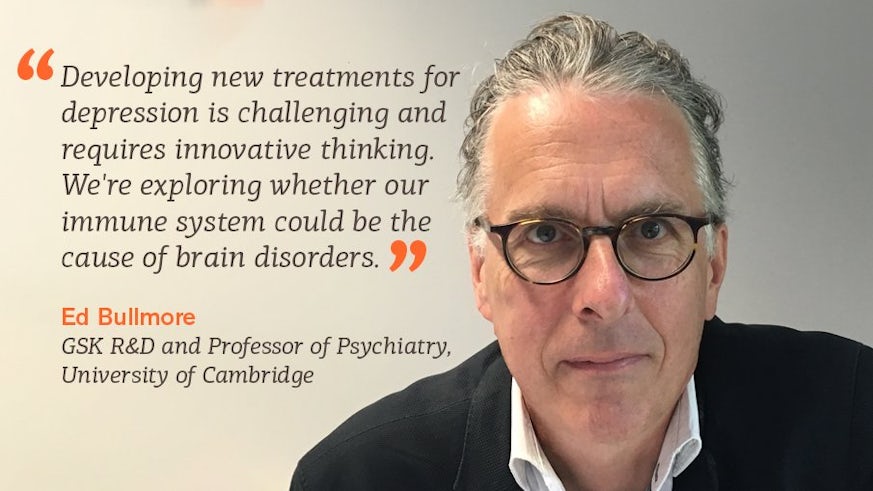Inflammation as a therapeutic target for depression
3 January 2018

Professor Ed Bullmore, Head of Cambridge University’s Department of Psychiatry, delivers an invigorating inaugural lecture to mark the Hodge Centre’s first annual meeting.
Hosted by the University’s Neuroscience and Mental Health Research Institute (NMHRI) at Cardiff University's flagship Hadyn Ellis Building, Professor Bullmore presented to a full house on ‘inflammation as a therapeutic target for depression’.
The event brought together key figures from the new Hodge Centre for Neuropsychiatric Immunology, which was launched in 2016 to unite experts in exploring how the brain’s immune system impacts neuro-conditions. Trustees of the Hodge Foundation, which supports both the Hodge Centre and this annual event, were also in attendance.
Watch Prof Ed Bullmore's public lecture
'Exciting connections'
Introducing the lecture, Professor Jeremy Hall, Director and Research Theme Lead at NMHRI, explained: “When you’re ill with a cold or infection, you don’t just feel physically unwell but mentally fatigued too.
“Recent research shows that the immune system, in addition to protecting the body against illness, plays an intimate role in the function of the brain, from its early development to its full function.
“Very excitingly, the immune system in the brain is implicated in diseases such as psychosis, depression and dementia. Understanding how this process works can tell us more about these conditions and, most importantly, how we can better treat them.”
Hailed as one of the first to recognise the potential in this research field, Prof Bullmore warned: “Mental health is the biggest single cause of disability in the UK.
“The World Health Foundation predicts that depression will be the biggest cause of disability by 2030. These are hugely common, disabling disorders and yet the level of research funding is disproportionately low for both the public and private sectors.

"The question is not why industry has backed away from supporting psychiatric research – but rather what are we going to do about it?"
Prof Bullmore highlights how there are many causes of inflammation, including everything from obesity and low grade infections (such as gum disease) to stress, and there is robust evidence showing a link between stress and depression.
Inflammation and depression
“There is irrefutable evidence now to suggest that depression is associated with increased levels of inflammatory proteins in the blood,” explained Prof Bullmore.
“We also look for over-expression of innate immune genes in the blood. There are many known interactions between genes, which speaks to the idea that the immune system really is a ‘system’. Immune abnormalities that we can expect to find in depression and psychosis will not be a single ‘smoking gun’ (i.e. one protein, one gene) but much more likely to be a disturbance in a system of interrelated genes.”
“Inflammation can have effects on large scale systems that we can measure with scanning,” Prof Bullmore continued. “It can impact neurons; but how do peripheral inflammatory signals get across the blood-brain barrier to do this? One way is porosity (holes) in the barrier large enough to allow through proteins or cells.

“For therapies, we have tended to focus on neurotransmitter receptors in the brain, but we have to be bold and think very differently about drug development if we are going to succeed in delivering better treatments for patients in the future.
“It is easy to see how neuronal mechanisms could change behaviour, and a targeted drug could be an anti-depressant. The problem with this traditional approach from a drug development perspective is that these targets – by virtue of being embedded in the brain – are very inaccessible. We lack biomarkers before we try out the drug.”
‘Immunology is everywhere’
Prof Bullmore believes that, if we switch our gaze to a more novel and different class of mechanisms in the immune system, we could imagine finding mechanistically specific biomarkers peripherally that we could use to target treatments.
“Immunology is everywhere,” Prof Bullmore continued. “It’s pervasive. It’s involved in almost every disease process. Immunological therapeutics have already been successful in cancer, multiple sclerosis and other disorders – so this is an area where industry is knowledgeable and confident. There are many drugs already out there that could be repurposed into psychiatry.
“Immunology finds a new way of explaining things we already know. There is not yet really good quality clinical trial data to show if placing this basic science into neuro-immunology is going to work for patients as too few trials have so far been done.
“If we can find ways to block these inflammatory cycles, perhaps we can make people less stressed or less depressed.”